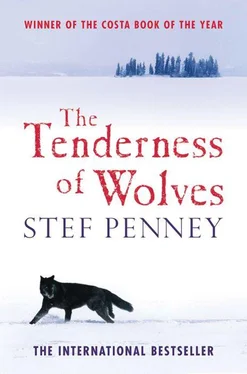‘Oh,’ I say, and the sound shocks me in the silent cabin. ‘No.’
I cling onto the door, trying not to run away, although I realise a second later I couldn’t move if my life depended on it.
The redness round his neck has leaked into the mattress from a gash. A gash. I’m panting, as though I’ve been running. The doorframe is the most important thing in the world right now. Without it, I don’t know what I would do.
The neckerchief has not done its duty. It has failed to prevent his untimely death.
I don’t pretend to be particularly brave, and in fact long ago gave up the notion that I have any remarkable qualities, but I am surprised at the calmness with which I look around the cabin. My first thought is that Jammet has destroyed himself, but Jammet’s hands are empty, and there is no sign of a weapon near him. One hand dangles off the side of the bed. It does not occur to me to be afraid. I know with absolute certainty that whoever did this is nowhere near–the cabin proclaims its emptiness. Even the body on the bed is empty. There are no attributes to it now–the cheerfulness and slovenliness and skill at shooting, the generosity and callousness–they have all gone.
There is one other thing I can’t help but notice, as his face is turned slightly away from me. I don’t want to see it but it’s there, and it confirms what I have already unwillingly accepted–that among all the things in the world that can never be known, Laurent Jammet’s fate is not one of them. This is no accident, nor is it self-destruction. He has been scalped.
At length, although it is probably only a few seconds later, I pull the door closed behind me, and when I can’t see him any more, I feel better. Although for the rest of that day, and for days after, my right hand aches from the violence with which I gripped the doorframe, as though I had been trying to knead the wood between my fingers, like dough.
We live in Dove River, on the north shore of Georgian Bay. My husband and I emigrated from the Highlands of Scotland a dozen years ago, driven out like so many others. A million and a half people arrived in North America in just a few years, but despite the numbers involved, despite being so crammed into the hold of a ship that you thought there couldn’t possibly be room in the New World for all these people, we fanned out from the landing stages at Halifax and Montreal like the tributaries of a river, and disappeared, every one, into the wilderness. The land swallowed us up, and was hungry for more. Hacking land out of the forest, we gave our places names that sprang from things we saw–a bird, an animal–or the names of old home towns; sentimental reminders of places that had no sentiment for us. It just goes to show you can’t leave anything behind. You bring it all with you, whether you want to or not.
A dozen years ago there was nothing here but trees. The country to the north of here is a mean land that is either bog or stones, where even the willows and tamaracks cannot take hold. But near the river the soil is soft and deep, the forest around it so dark green it is almost black, and the sharp scented silence feels as deep and endless as the sky. My first reaction, when I saw it, was to burst into tears. The cariole that brought us rattled away, and the thought that, however loudly I screamed, only the wind would answer, could not be pushed away. Still, if the idea was to find peace and quiet, we had succeeded. My husband waited calmly for my fit of hysteria to subside, then said, with a grim sort of smile:
‘Out here, there is nothing greater than God.’
Assuming you believe in that sort of thing, it seemed a safe bet.
In time I got used to the silence, and the thinness of the air that made everything seem brighter and sharper than it had back home. I even grew to like it. And I named it, since it had no name that anyone knew of: Dove River.
I’m not immune to sentimentality myself.
Others came. Then John Scott built the flour mill near the river mouth, and having spent so much money on it, and it having such a nice view of the bay, decided he might as well live in it. Somehow this started a fashion for living near the shore, inexplicable to those of us who had gone upriver precisely to escape the howling storms when the Bay seems to turn into an angry ocean intent on clawing back the land you have so presumptuously settled. But Caulfield (sentiment again; Scott is from Dumfriesshire) took in a way that Dove River never could–because of the abundance of level land and relative sparseness of the forest, and because Scott opened a dry goods store that made backwoods life a lot easier. Now there is a community of over a hundred–a strange mix of Scots and Yankees. And Laurent Jammet. He hasn’t–hadn’t–been here long, and probably would never have moved here at all had he not taken the piece of land that no one else would touch.
Four years ago he bought the farm downstream from ours. It had been lying empty for some time, on account of the previous owner, an elderly Scot. Doc Wade arrived in Dove River seeking cheap land where he would not be so much under the noses of those who judged him–he had a wealthy sister and brother-in-law in Toronto. People called him Doc, although it turned out he was not a doctor at all, just a man of culture who had not found a place in the New World that appreciated his varied but nebulous talents. Unfortunately Dove River was not the exception he was looking for. As many men have found, farming is a slow, sure way to lose your fortune, destroy your health, and break your spirit. The work was too heavy for a man of his age, and his heart was not in it. His crops failed, his pigs ran wild in the forest, his cabin roof caught fire. One evening he slipped on the rock that forms a natural jetty in front of his cabin, and was later found in the deep eddy below Horsehead Bluff (so named, with that refreshing Canadian lack of imagination, because it resembles a horse’s head). It was a merciful release after his troubles, said some. Others called it a tragedy–the sort of small, domestic tragedy the bush is littered with. I suppose I imagined it differently. Wade drank, like most men. One night, when his money was gone and the whisky finished, when there was nothing left for him to do in this world, he went down to the river and watched the cold black water rushing past. I imagine he looked up at the sky, heard the mocking, indifferent voice of the forest one last time, felt the tug of the swollen river, and cast himself onto its infinite mercy.
Afterwards, local gossip said that the land was unlucky, but it was cheap and Jammet was not one to take note of superstitious rumours, although perhaps he should have. He had been a voyageur for the Company, and had fallen under a canoe while hauling it up some rapids. The accident lamed him, and they gave him compensation. He seemed grateful rather than otherwise for his accident, which gave him enough money to buy his own land. He was fond of saying how lazy he was, and certainly he did not do the farm work that most men cannot avoid. He sold off most of Wade’s land and made his living from the wolf bounty and a little trading. Every spring a succession of dark, long-distance men would come from the northwest with their canoes and packs. They found him a congenial person to do business with.
Half an hour later I am knocking on the door of the biggest house in Caulfield. I flex the fingers of my right hand as I wait for an answer–they seem to have seized up into a sort of claw.
Mr Knox has a poor, greyish complexion that makes me think of liver salts, and is tall and thin, with a hatchet profile that seems permanently poised to strike down the unworthy–useful attributes for a magistrate. I suddenly feel as empty as if I had not eaten for a week.
‘Ah, Mrs Ross … an unexpected pleasure …’
Читать дальше












